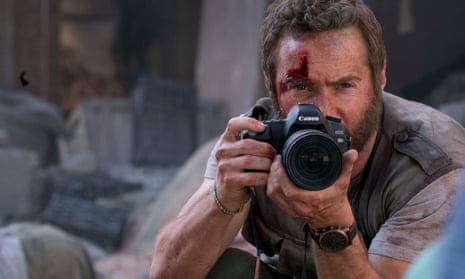Tank Man. I had forgotten ever hearing the phrase, used 30 years ago to describe the unidentified figure who stood in front of the tanks advancing towards Tiananmen Square the morning after the Chinese military opened fire on its own people to end the anti-government protests for human and press rights, killing hundreds, possibly thousands, of civilians.
He wasn’t the only person who did so – but he was the only one whose image was captured (by Jeff Widener) and sent around the world. It was not only the most arresting photograph of the protests, but also served as an illustration of the personal responsibility we bear to stand up to evil.
In Chimerica, a sinuous, sinewy four-part adaptation for Channel 4 by Lucy Kirkwood of her own multi-award-winning play, the picture is taken by the fictional Lee Berger (played as a young man by Ty Simpkins), marking the beginning of his career as a war photographer. We next meet him – now played by Alessandro Nivola as a pitch-perfect blend of intensity, charm and self-belief – in 2016. The world is gearing up for what it thinks will be a second Clinton presidency, just as he secures another heartstopping shot – and front page on the New York daily where he works – in Syria. A soldier stands with his gun to a woman’s head, poised to shoot her as she sits in the aftermath of a bomb with her bloodied young son on her lap. His editor Frank Sams (the mighty F Murray Abraham, wonderful, if underused) is delighted. There is talk of a Pulitzer. On the flight to his next job – getting video footage of Chinese attendees of a Beijing business fair recommending that Americans vote for Donald Trump – he meets Tess (Sophie Okonedo, also underused so far) and life is looking altogether splendid.
What follows is the slow unravelling of life as he – and in the background, the US – knows it. As Trump builds his campaign out of a collage of lies, fake news, groundless assertions and grandiose claims, Berger is forced by a journalism student to admit that his Syrian photo is doctored. And so the central question for him, for his country and for the drama becomes: how do you come back from that? Once the integrity of a man or a system has been lost, once trust is gone, is it gone for good? Can the end – getting Syria on the front page when it had customarily been buried on page 12 – justify the means? His editor appears willing to give him a chance to rebuild his reputation, but his fellow war journalist and friend Mel Kincaid (an utterly magnificent performance by Cherry Jones) roars at him: “There’s no excuse for what you did … do you know you’ve broken my fucking heart?” What might have remained an interesting, near-abstract problem is suddenly made deeply, wrenchingly real.
Berger’s – not fully convincing – solution to his problems is to set out in search of Tank Man, around whose identity rumours have swirled since 1989. His trips to Beijing bring him back in touch with his old friend Zhang Lin, who was a protester in the square and whose wife was killed in the massacre. Thirty years on, Zhang remains fundamentally lost without her and dreams/hallucinates her presence.
Tess, meanwhile, makes it clear to Berger that their relationship is “just a work thing”. Although when she reveals that she – a consultant for a credit-card company trying to break into the Chinese market – doesn’t appreciate the scale of what he’s done (“So what if things are Photoshopped? We do it all the time. It’s still saying something. It can still be true”), this doesn’t seem like quite the loss it first did.
The layers of delusion, deception and misunderstanding that matters of the heart as well as politics bring adds another strand to the exploration of the lies people tell, and upon which life turns.
It’s a strikingly intelligent drama, capturing big ideas without sacrificing story or character, and making the personal political and back again – particularly in the scenes set in China. There, the evidence of history being rewritten is everywhere, as when Berger’s young waitress has no idea that anything ever happened in Tiananmen Square, and knowledge of current affairs is severely limited in a country that has access only to government-approved websites.
It, unexpectedly and thrillingly, makes you care anew about issues that sometimes seem too large and ineffable to grapple with. It is a miracle of distillation and animation, and is available on All4 in its entirely. Run, don’t walk.

Comments (…)
Sign in or create your Guardian account to join the discussion